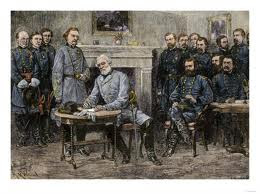When studying the American Civil War the last component we learn about is the Reconstruction Era. It was a time in American History that showed the broken nation trying to piece itself back together. We all learn about the Radical Republicans, the Carpetbaggers, the ending of slavery and so on but there is one topic that is always overlooked, The Alabama Claims. The Alabama Claims are an example of how the American Civil War was more than just an American event but was a world wide event.
mrkash.com
The Civil War was one of the darkest times in American History. It is also the most discussed event in American History as it was a turning point in American political, economic and cultural history. There are actually so many events, issues and stories from the Civil War that it is easy to over look some of them. For example I have previously written about the lost Confederate submarine the CSS H.L. Hunley (Sorry I know that was a shameless self plug). But my point is even though the Civil War lasted four years and Reconstruction lasted another twelve so you can see how easy it is to forget everything surrounding the Civil War. And one of these events is the Alabama Claims.
uri.edu
The Alabama Claims actually have nothing to do with the state of Alabama but a with the Confederate sloop of war CSS Alabama. The Alabama was built in Birkenhead, England in 1862 for the Confederates. These ships were built by English companies knowing that they would be used specifically to attack Union ships and harbors. The English Prime Minister Lord Palmerston and Foreign Secretary Lord John Russell not only knew about the Alabama and several ships like her but allowed for them to be completed and sold even with objection from American Minister to Britain Charles Francis Adams. After the news of the Alabama had spread across England, both the Prime Minister and Foreign Secretary were quite embarrassed as they had violated England's neutrality claims in the American Civil War. However, the damage had been done as the Alabama was setting sail towards the American coast and prepared for war.
wikipedia.org
The Alabama was armed to the teeth, well at least for 19th century standards. She was armed with six 32lb cannons and with a 68lb and 110lb cannon. She had several successful raids against Union ships. From August of 1863 until December of 1863 the Alabama was unstoppable. During this time the Alabama burned somewhere around 65 Union ships, after taking supplies and goods of course, boarded around 400 ships, took about 2000 POW's and sank the USS Hatteras all without losing a single crew member. However, no one can stay unbeaten forever and the Alabama and her crew were soon to find that out the hard way.
history.naval.mil
The Battle of Cherbourg is pretty much forgotten when discussing battles of the Civil War, especially the naval battles. The Alabama arrived in Cherbourg, France to dry dock and repair. However, the USS Kearsarge was hot on her tail and followed her to France. The captain of the Kearsarge also sent for backup and telegraphed for the USS St. Louis to assist in taking the Alabama. Now the Alabama and Kearsarge were pretty evenly matched but the St. Louis was one bad ass ship, a man-o-war armed with TWENTY 24lb smooth bore cannons. Not wanting to surrender his ship the Alabama's Captain Semmes decided to make a run and fight his way out. This would be a bad move on the old Captains part as he was out gunned and out classed by the Union Captains and ships. About an hour after the first shot was fired the Alabama was on her way to the bottom of the ocean. Not many men were lost that day as the ship did sink slowly, however Captain Semmes was never taken, he was actually picked out of the water by a British yacht which happened to also be in the area.
Captain Semmes made it back to the states...well Confederate States in February before the war ended but the damage had been done by he and the Alabama. The war itself would end a few months later and it was time for the America to put itself back together, however there was someone who need to pay up for some damages caused. The Alabama ran up a hefty tab at the expense of the Union, a total of some $6,000,000 dollars in damages and loses. The Confederacy was abolished and the southern states barely were able to run a lemonade stand let only pay the damages which they owed. So looks like it's those limey tea drinking Brits fault...again. The United States put the damage caused by the Alabama squarely on the shoulders of the British and called it, well they called it the Alabama Claims. The claim was that the British directly violated the neutrality act by knowing and allowing the Alabama to be constructed. So the U.S. sent a bill over to jolly old England and awaited their response.
etc.usf.edu
The United States sent over a well planned exchange in order to pay for the damages caused by the Alabama. At first they felt it best for a lump some of $2 billion dollars or just give Canada to the U.S. This was all in part to the wonderful idea of Manifest Destiny and it quickly fell through as Congress was busy with Reconstruction and rebuilding the nation. It wouldn't be until President Grant's Secretary of State Hamilton Fish worked out a deal in 1871. American and British representatives got together and not just worked out the issue over the Alabama but several other issues between the two nations. In the end the Treaty of Washington was signed in march of 1871 and the Brits paid the U.S. a sum of $15,500,00 dollars and apologized for allowing the Alabama to be built. It was from then on that there was almost no differences between the two nations, making them the allies they have been for the last some 120 years.
uri.edu
Today the Alabama lay beneath 200 ft of water off the coast for Cherbourg for 121 years. She was discovered by the French Navy and confirmed by Captain Max Guerout as the Alabama. The Association of the CSS Alabama have been in charge of the wreck since 1988. The U.S. and France have both worked on with the Association in efforts to preserve the wreck and in its excavation. Since the late 1980s there have been numerous artifacts found and raised from the Alabama. In 2002 the ship's bell was raised. The artifacts helped piece together not only the mid 19th ship, but also what life on a ship during the Civil War was like. The artifacts found on the Alabama are kept at the Underwater Archaeology Branch, Naval History & Heritage Command in Washington D.C. The Association also created an online museum for those who can't make it to D.C. so you might want to check that out instead. But what do we learn from the Alabama Claims? Well it has been noted that the Alabama Claims was the predecessor to many multinational unions. I mean the convention between the U.S. and England was overseen not just by American and British officials but Italian, Swiss and Brazilian officials. The meeting took place in Geneva's Town Hall. It would ultimately become the standard for international arbitration. It cemented a need for international law and showed the need for peaceful meetings in order to avoid war. Some historians even claim that the Alabama Claims were the blueprint for future international meetings such as the League of Nations, United Nation and World Court. In the end the Alabama and the Alabama Claims are another part of American History which are being overlooked yet have influenced our modern world more than were actually knew.
The United States sent over a well planned exchange in order to pay for the damages caused by the Alabama. At first they felt it best for a lump some of $2 billion dollars or just give Canada to the U.S. This was all in part to the wonderful idea of Manifest Destiny and it quickly fell through as Congress was busy with Reconstruction and rebuilding the nation. It wouldn't be until President Grant's Secretary of State Hamilton Fish worked out a deal in 1871. American and British representatives got together and not just worked out the issue over the Alabama but several other issues between the two nations. In the end the Treaty of Washington was signed in march of 1871 and the Brits paid the U.S. a sum of $15,500,00 dollars and apologized for allowing the Alabama to be built. It was from then on that there was almost no differences between the two nations, making them the allies they have been for the last some 120 years.
uri.edu
Today the Alabama lay beneath 200 ft of water off the coast for Cherbourg for 121 years. She was discovered by the French Navy and confirmed by Captain Max Guerout as the Alabama. The Association of the CSS Alabama have been in charge of the wreck since 1988. The U.S. and France have both worked on with the Association in efforts to preserve the wreck and in its excavation. Since the late 1980s there have been numerous artifacts found and raised from the Alabama. In 2002 the ship's bell was raised. The artifacts helped piece together not only the mid 19th ship, but also what life on a ship during the Civil War was like. The artifacts found on the Alabama are kept at the Underwater Archaeology Branch, Naval History & Heritage Command in Washington D.C. The Association also created an online museum for those who can't make it to D.C. so you might want to check that out instead. But what do we learn from the Alabama Claims? Well it has been noted that the Alabama Claims was the predecessor to many multinational unions. I mean the convention between the U.S. and England was overseen not just by American and British officials but Italian, Swiss and Brazilian officials. The meeting took place in Geneva's Town Hall. It would ultimately become the standard for international arbitration. It cemented a need for international law and showed the need for peaceful meetings in order to avoid war. Some historians even claim that the Alabama Claims were the blueprint for future international meetings such as the League of Nations, United Nation and World Court. In the end the Alabama and the Alabama Claims are another part of American History which are being overlooked yet have influenced our modern world more than were actually knew.













